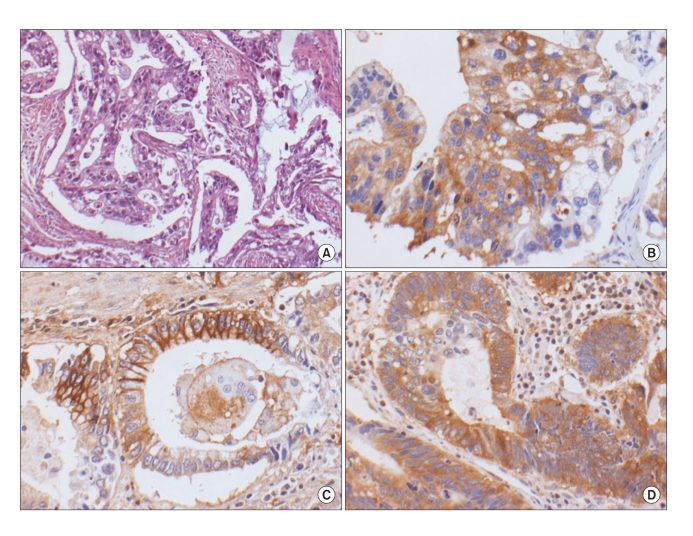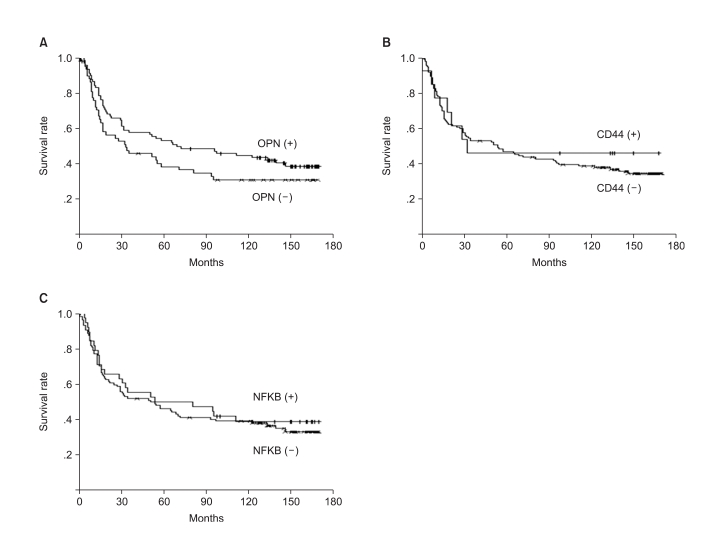Cancer Res Treat.
2009 Mar;41(1):29-35.
Osteopontin, CD44, and NFkappaB Expression in Gastric Adenocarcinoma
- Affiliations
-
- 1Department of Pathology, Inje University Sanggye Paik Hospital, Seoul, Korea. pck2973@yahoo.co.kr
- 2Department of Surgery, Inje University Sanggye Paik Hospital, Seoul, Korea.
- 3Kyung Hee University East-West Neomedical Center Bone & Joint Research Center, Seoul, Korea.
Abstract
-
PURPOSE: Osteopontin (OPN) binds to CD44 and nuclear factor-kappaB (NFkappaB) and OPN mediates tumorigenesis, invasion and metastasis, but the interrelationships between OPN, CD44 and NFkappaB are not fully understood, and especially in gastric carcinogenesis. We examined the expressions of OPN, CD44, and NFkappaB in untreated gastric adenocarcinomas.
MATERIALS AND METHODS
The materials from 211 cases of gastric adenocarcinoma were immunostained for OPN, CD44 and NFkappaB by using a tissue microarray. The OPN mRNA expression was measured in 10 cases by performing real-time RT-PCR.
RESULTS
The expression of OPN, CD44 and NFkappaB was noted in 61.7%, 11.4% and 26.6% of the adenocarcinoma tissues, respectively. No significant correlation was detected among the expressions of these proteins. The OPN protein expression was negatively correlated with angioinvasion (p<0.05) and patient survival (p<0.05), whereas the CD44 and NFkappaB protein expressions were not correlated with any of the clinicopathological factors we examined. The depth of invasion, lymph node status and perineural invasions were prognostic factors based on the Cox analysis. The OPN mRNA expression showed no significant difference between the adenocarcinoma and the paired normal mucosa on real-time RT-PCR.
CONCLUSION
OPN may have a currently undetermined role in gastric carcinogenesis, and CD44 and NFkappaB may have minor roles in gastric adenocarcinoma.
Keyword
MeSH Terms
Figure
Reference
-
1. Fock KM, Talley N, Moayyedi P, Hunt R, Azuma T, Sugano K, et al. Asia-Pacific consensus guidelines on gastric cancer prevention. J Gastroenterol Hepatol. 2008; 23:351–365. PMID: 18318820.
Article2. Yasui W, Sentani K, Motoshita J, Nakayama H. Molecular pathobiology of gastric cancer. Scand J Surg. 2006; 95:225–231. PMID: 17249269.
Article3. Guarino V, Faviana P, Salvatore G, Castellone MD, Cirafici AM, De Falco V, et al. Osteopontin is overexpressed in human papillary thyroid carcinomas and enhances thyroid carcinoma cell invasiveness. J Clin Endocrinol Metab. 2005; 90:5270–5278. PMID: 15998773.
Article4. Cook AC, Tuck AB, McCarthy S, Turner JG, Irby RB, Bloom GC, et al. Osteopontin induces multiple changes in gene expression that reflect the six 'hallmarks of cancer' in a model of breast cancer progression. Mol Carcinog. 2005; 43:225–236. PMID: 15864800.
Article5. Irby RB, McCarthy SM, Yeatman TJ. Osteopontin regulates multiple functions contributing to human colon cancer development and progression. Clin Exp Metastasis. 2004; 21:515–523. PMID: 15679049.
Article6. Tuck AB, Hota C, Wilson SM, Chambers AF. Osteopontin-induced migration of human mammary epithelial cells involves activation of EGF receptor and multiple signal transduction pathways. Oncogene. 2003; 22:1198–1205. PMID: 12606946.
Article7. Tuck AB, Chambers AF. The role of osteopontin in breast cancer: clinical and experimental studies. J Mammary Gland Biol Neoplasia. 2001; 6:419–429. PMID: 12013531.8. Murai T, Miyazaki Y, Nishinakamura H, Sugahara KN, Miyauchi T, Sako Y, et al. Engagement of CD44 promotes Rac activation and CD44 cleavage during tumor cell migration. J Biol Chem. 2004; 279:4541–4550. PMID: 14623895.
Article9. Philip S, Kundu GC. Osteopontin induces nuclear factor κB-mediated promatrix metalloproteinase-2 activation through IκBα/IKK signaling pathways, and curcumin (diferulolylmethane) down-regulates these pathways. J Biol Chem. 2003; 278:14487–14497. PMID: 12473670.10. Philip S, Bulbule A, Kundu GC. Osteopontin stimulates tumor growth and activation of promatrix metalloproteinases-2 through nuclear factor-kappa B-mediated induction of membrane type 1 matrix metalloproteinase in murine melanoma cells. J Biol Chem. 2001; 276:44926–44935. PMID: 11564733.11. Renault MA, Jalvy S, Potier M, Belloc I, Genot E, Dekker LV, et al. UTP induces osteopontin expression through a coordinate action of NFkB, activator protein-1, and upstream stimulatory factor in arterial smooth muscle cells. J Biol Chem. 2005; 280:2708–2713. PMID: 15557322.12. Samant RS, Clark DW, Fillmore RA, Cicek M, Metge BJ, Chandramouli KH, et al. Breast cancer metastasis suppressor 1 (BRMS1) inhibits osteopontin transcription by abrogating NFkB activation. Mol Cancer. 2007; 6:6–15. PMID: 17227585.
Article13. Kim JY, Lim S, Park K. Cyclooxygenase-2 and c-erbB-2 expression in gastric carcinoma assessed using tissue microarrays. Appl Immunohistochem Mol Morphol. 2004; 12:67–70. PMID: 15163022.14. Livak KJ, Schmittgen TD. Analysis of relative gene expression data using real-time quantitative PCR and the 2-ΔΔCT method. Methods. 2001; 25:402–408. PMID: 11846609.15. Weber GF. The metastasis gene osteopontin: a candidate target for cancer therapy. Biochem Biophys Acta. 2001; 1552:61–85. PMID: 11825687.
Article16. Eschrich S, Yang I, Bloom G, Kwong KY, Boulware D, Cantor A, et al. Molecular staging for survival prediction of gastric cancer patients. J Clin Oncol. 2005; 23:3526–3535. PMID: 15908663.17. Wu CY, Wu MS, Chiang EP, Wu CC, Chen YJ, Chen CJ, et al. Elevated plasma osteopontin associated with gastric cancer development, invasion and survival. Gut. 2007; 56:782–789. PMID: 17148500.
Article18. Coppola D, Szabo M, Boulware D, Muraca P, Alsarraj M, Chambers AF, et al. Correlation of osteopontin protein expression and pathological stage across a side variety of tumor histologies. Clin Cancer Res. 2004; 10:184–190. PMID: 14734468.19. Selkirk SM, Morrow J, Barone TA, Hoffer A, Lock J, DeChant A, et al. Elevation of osteopontin levels in brain tumor cells reduces burden and promotes survival through the inhibition of cell dispersal. J Neurooncol. 2008; 86:285–296. PMID: 17928956.
Article20. Matsuzaki H, Shima K, Muramatsu T, Ro Y, Hashimoto S, Shibahara T, et al. Osteopontin as biomarker in early invasion by squamous cell carcinoma in tongue. J Oral Pathol Med. 2007; 36:30–34. PMID: 17181739.
Article21. Lee JL, Wang MJ, Sudhir PR, Chen GD, Chi CW, Chen JY. Osteopontin promotes integrin activation through outside-in and inside-out mechanism:OPN-CD44v interaction enhances survival in gastrointestinal cancer cells. Cancer Res. 2007; 67:2089–2097. PMID: 17332338.22. Wai PY, Mi Z, Guo H, Sarraf-Yazdi S, Gao C, Wei J, et al. Osteopontin silencing by small interfering RNA suppresses in vitro and in vivo CT26 murine colon adenocarcinoma metastasis. Carcinogenesis. 2005; 26:741–751. PMID: 15661802.
Article23. Bourguignon LY, Xia W, Wong G. Hyaluronan-mediated CD44 interaction with p300 and SIRT1 regulates beta-catenin signaling and NFkB-specific transcription activity leading to MDR1 and Bcl-xL gene expression and chemoresistance in breast tumor cells. J Biol Chem. 2009; 284:2657–2671. PMID: 19047049.
- Full Text Links
- Actions
-
Cited
- CITED
-
- Close
- Share
- Similar articles
-
- Expression of CD44 Splicing Variants v4/5 and v6 in Gastric Adenocarcinoma and Its Relationship with Prognostic Factors
- Expression of CD44 Standard, Variant 6 and Relationship to the Lymph Node Metastasis in Gastric Adenocarcinoma
- Increased expression of osteopontin in the spinal cords of Lewis rats with experimental autoimmune neuritis
- Expression of Osteopontin, ZO-1 and E-cadherin in Adenoma and Adenocarcinoma of the Colon
- The Ratio of CD44 Epithelial Variant Transcript to CD44 Hematopoietic Variant Transcript: Prognostic Significance in Gastric Adenocarcinoma



